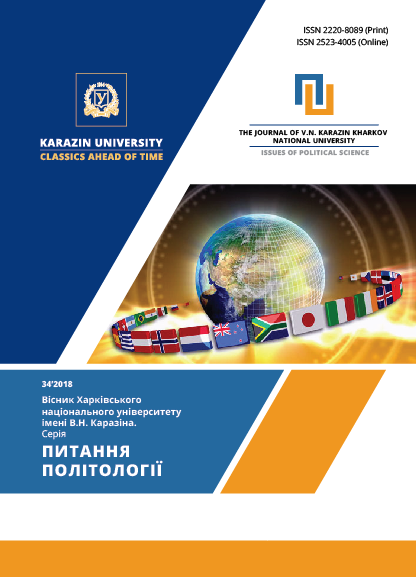ПОЛІТИКО-ІНСТИТУЦІОНАЛЬНІ КОЛИВАННЯ ГІБРИДНИХ РЕЖИМІВ
Анотація
Досліджується феномен політико-інституціональних коливань гібридного політичного режиму як окремого, проміжного типу. Термін «гібридний режим» виникає в рамках транзитологічних досліджень поставтоританих режимів у різних регіонах світу. Транзитологами було відзначено, що такі режими мають властивості, як авторитарних, так і демократичних режимів. На появу таких режимів впливають різноманітні чинники: від глобалізації та геополітичного оточення до особливостей політичної культури політичного істеблішменту та широкого загалу населення, яке знаходиться між авторитарним і демократичним режимами. Виокремлено та проаналізовано основні концептуальні проблеми, що виникають під час вивчення такого типу політичного режиму. Розглянуто сучасні підходи до типології гібридних політичних режимів. Американський політолог Л. Даймонд ще у 1996 р., констатуючи кінець «третьої хвилі» демократизації, наголосив, що головною причиною її «спаду» став перехід низки країн не до ліберальної демократії, а до проміжних форм політичних режимів. З того часу з’явилась велика кількість різноманітних концепцій так званих гібридних політичних режимів, що свідчить, з одного боку, про високу актуальність і зацікавленість наукових кіл проблематикою дослідження проміжних типів політичних режимів, а з другого – про неоднозначність підходів до концептуалізації цього феномена. Це пов’язано з тим, що термін «гібридний режим» потребує певної концептуалізації з урахуванням регіональної специфіки. У руслі дослідження гібридності або уточнення цього поняття виникла концепція неопатримоніалізму, неопатримоніальної демократії, що розвиває оптичне фокусування на особливостях пострадянських режимів. Водночас це дозволяє залучати до аналізу інститути, що виникають на перетині мережевих і системних площин.
Завантаження
Посилання
Diamond, L. 1996. “Is the Third Wave Over?” Journal of Democracy. Vol. 7, 3: 20-37.
Тилли, Ч. 2007. Демократия. М.: Институт общественного проектирования.
O’Donnell G., Schmitter P. 1986. Transitions from Authoritarian Rule: Tentative Conclusions about Uncertain Democracies. Baltimore, MD: Johns Hopkins University Press.
О’Донелл Г. 1997. Делегативная демокра-тия Пределы власти. URL: http://old.russ.ru/antolog/predely/2$3/dem01.htm (дата звернення 1.11.2018).
Morlino L. 2009. “Are there Hybrid Regimes? Or is it an Optical Illusion” European Political Science Review, 1(2): 273-296.
Way, L. 2004. “The Sources and Dynamics of Competitive Authoritarianism in Ukraineˮ, Journal of Communist Studies and Transition Politics. Vol. 20, 1: 1-19.
Schedler Andreas. 1998. “What Is Democratic Consolidation”, Journal of Democracy. Vol. 9. 2 (April): 91-107.
Мирошниченко, Е., Морозова, И. 2015. “Гибридные политические режимы в совре-меннных политияхˮ Вестник МГУ. Сер. 21. Управление (государство и общество) 3: 34-46.
Freedom House. 2018. URL: https://freedomhouse.org/sites/default/files/FOTN_2018_Final%20Booklet_11_1_2018.pdf (дата звернення 1.11.2018).
Фисун, А.А. 2010. “К переосмыслению постсоветской политики: неопатримониальная интерпретация“, Политическая концептология 4: 158-187.
Мацієвський, Ю. В. 2016. У пастці гібрид-ності: зиґзаґи трансформацій політичного режиму в Україні (1991-2014): монографія. Чернівці : Книги XXI.
Авторські права та ліцензування.
Ліцензійні умови: автори зберігають авторське право, а також надають право журналу публікувати оригінальні наукові статті, що містять результати досліджень і не знаходяться на розгляді для опублікування в інших віданнях. Всі матеріали поширюється на умовах ліцензії Creative Commons Attribution License International CC-BY, яка дозволяє іншим розповсюджувати роботу з визнанням авторства цієї роботи і першої публікації в цьому журналі.
Якщо стаття прийнята до друку в журналі "Вісник Харківського національного університету імені В.Н. Каразіна. Серія "Питання політології", автор має підписати угоду про передачу авторських прав. Угода надсилається на поштову (оригінал) або електронну адресу (сканована копія) Редакції журналу.
Цією угодою автор засвідчує, що поданий матеріал:
- не порушує авторських прав інших осіб або організацій;
- не був опублікований раніше у інших видавництвах та не був поданий до публікації у інші видання.
Автор передає редколегії права на:
- публікацію статті українською (англійською) мовою та розповсюдження її друкованої версії;
- переклад статті англійською мовою (для статей українською мовою) та розповсюдження друкованої версії перекладу;
- розповсюдження електронної версії статті, а також електронної версії англомовного перекладу статті (для статей українською та російською мовою), через будь-які електронні засоби (розміщення на офіційному web-сайті журналу, в електронних базах даних, репозитаріях тощо).
Автор зберігає за собою право без узгодження з редколегією та засновниками:
- Використовувати матеріали статті повністю або частково з освітньою метою.
- Використовувати матеріали статті повністю або частково для написання власних дисертацій.
- Використовувати матеріали статті для підготовки тез, доповідей конференцій, а також усних презентацій.
- Розміщувати електронні копії статті (у тому числі кінцеву електронну версію, завантажену з офіційного web-сайту журналу) на:
- персональних web-ресурсах усіх авторів (web-сайти, web-сторінки, блоги тощо);
- web-ресурсах установ, де працюють автори (включно з електронними інституційними репозитаріями);
- некомерційних web-ресурсах відкритого доступу (наприклад, arXiv.org).




